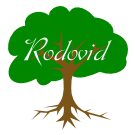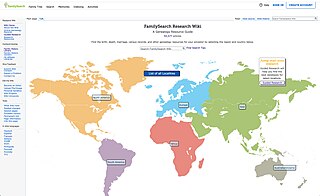
Genealogy is the study of families, family history, and the tracing of their lineages. Genealogists use oral interviews, historical records, genetic analysis, and other records to obtain information about a family and to demonstrate kinship and pedigrees of its members. The results are often displayed in charts or written as narratives. The field of family history is broader than genealogy, and covers not just lineage but also family and community history and biography.

A Wiki software, is collaborative software that runs a wiki, which allows the users to create and collaboratively edit pages or entries via a web browser. A wiki system is usually a web application that runs on one or more web servers. The content, including previous revisions, is usually stored in either a file system or a database. Wikis are a type of web content management system, and the most commonly supported off-the-shelf software that web hosting facilities offer.

Wiktionary is a multilingual, web-based project to create a free content dictionary of terms in all natural languages and in a number of artificial languages. These entries may contain definitions, images for illustrations, pronunciations, etymologies, inflections, usage examples, quotations, related terms, and translations of words into other languages, among other features. It is collaboratively edited via a wiki. Its name is a portmanteau of the words wiki and dictionary. It is available in 183 languages and in Simple English. Like its sister project Wikipedia, Wiktionary is run by the Wikimedia Foundation, and is written collaboratively by volunteers, dubbed "Wiktionarians". Its wiki software, MediaWiki, allows almost anyone with access to the website to create and edit entries.

A family tree, also called a genealogy or a pedigree chart, is a chart representing family relationships in a conventional tree structure. More detailed family trees, used in medicine and social work, are known as genograms.
GEDCOM is an open de facto specification for exchanging genealogical data between different genealogy software. GEDCOM was developed by The Church of Jesus Christ of Latter-day Saints as an aid to genealogical research.
Genetic genealogy is the use of genealogical DNA tests, i.e., DNA profiling and DNA testing, in combination with traditional genealogical methods, to infer genetic relationships between individuals. This application of genetics came to be used by family historians in the 21st century, as DNA tests became affordable. The tests have been promoted by amateur groups, such as surname study groups or regional genealogical groups, as well as research projects such as the Genographic Project.
FamilySearch is a nonprofit organization and website offering genealogical records, education, and software. It is operated by The Church of Jesus Christ of Latter-day Saints, and is closely connected with the church's Family History Department. The Family History Department was originally established in 1894 as the Genealogical Society of Utah (GSU) and is the largest genealogy organization in the world. FamilySearch maintains a collection of records, resources, and services designed to help people learn more about their family history. Facilitating the performance of LDS ordinances for deceased relatives is another major aim of the organization. Although it requires user account registration, it offers free access to its resources and service online at FamilySearch.org. In addition, FamilySearch offers personal assistance at more than 5,100 family history centers in 140 countries, including the Family History Library in Salt Lake City, Utah. The Family Tree section allows user-generated content to be contributed to the genealogical database. As of February 2021, there are over 1.3 billion individuals in the tree and the historical records database contains over 5.7 billion digital images, including digitized books, digitized microfilm, and other digital records.
A genealogical DNA test is a DNA-based test used in genetic genealogy that looks at specific locations of a person's genome in order to find or verify ancestral genealogical relationships, or to estimate the ethnic mixture of an individual. Since different testing companies use different ethnic reference groups and different matching algorithms, ethnicity estimates for an individual vary between tests, sometimes dramatically.
Microformats (μF) are a set of defined HTML classes created to serve as consistent and descriptive metadata about an element, designating it as representing a certain type of data. They allow software to process the information reliably by having set classes refer to a specific type of data rather than being arbitrary. Microformats emerged around 2005 and were predominantly designed for use by search engines, web syndication and aggregators such as RSS.
A semantic wiki is a wiki that has an underlying model of the knowledge described in its pages. Regular, or syntactic, wikis have structured text and untyped hyperlinks. Semantic wikis, on the other hand, provide the ability to capture or identify information about the data within pages, and the relationships between pages, in ways that can be queried or exported like a database through semantic queries.

A royal descent is a genealogical line of descent from a past or present monarch.

Semantic MediaWiki (SMW) is an extension to MediaWiki that allows for annotating semantic data within wiki pages, thus turning a wiki that incorporates the extension into a semantic wiki. Data that has been encoded can be used in semantic searches, used for aggregation of pages, displayed in formats like maps, calendars and graphs, and exported to the outside world via formats like RDF and CSV.
The Sorenson Molecular Genealogy Foundation (SMGF) was an independent DNA and genealogical research institution with the goal of demonstrating how the peoples of the world are related. SMGF collected DNA samples and genealogical information from individuals across the globe to establish these connections.

Uncyclopedia is a satirical online encyclopedia that parodies Wikipedia. Its logo, a hollow "puzzle potato", parodies Wikipedia's globe puzzle logo, and it styles itself "the content-free encyclopedia", parodying Wikipedia's slogan of "the free encyclopedia". Founded in 2005 as an English-language wiki, the project spans over 75 languages as well as several subprojects parodying other wikis. The English version has approximately 36,000 pages of content, second only to the Portuguese. Uncyclopedia's name is a portmanteau of the prefix "un-" and the word "encyclopedia".

Rodovid is a free online collaborative family tree portal. Originally a Ukrainian project, as of 2012 it had active communities in 25 languages. It provides a web service built using MediaWiki and its own Rodovid Engine software to help store and visualize family relationships.

WeRelate.org is a wiki genealogy website, that provides genealogy tools and data. It bills itself as the world's largest freely licensed genealogy wiki, with almost 5 million wiki pages. Its information is free, and the site is non-commercial and nonsectarian. WeRelate had over 2.5 million person pages, over 930,000 family pages and 44,000 images in January 2014.

The International Society of Genetic Genealogy (ISOGG) is an independent non-commercial nonprofit organization of genetic genealogists run by volunteers. It was founded by a group of surname DNA project administrators in 2005 to promote DNA testing for genealogy. It advocates the use of genetics in genealogical research, provides educational resources for genealogists interested in DNA testing, and facilitates networking among genetic genealogists. As of June 2013, it comprises over 8,000 members in 70 countries. As of July 2013, regional meetings are coordinated by 20 volunteer regional coordinators located in the United States, Australia, Brazil, Canada, England, Egypt, Ireland and Russia.

WikiTree is a free, shared social-networking genealogy website that allows users individually to research and to contribute to their own personal family trees while building and collaborating on a singular worldwide family tree within the same system. Chris Whitten, developer of the WikiAnswers website, set up WikiTree in 2008; the site is owned and hosted by Interesting.com, Inc. The site uses a "wiki markup" language that offers users the ability to create and edit personal profiles, categories and "free space" pages to document their family's history. As of June 2022, the WikiTree website had more than 900,000 registered members and included more than 30 million profiles, with 10 million having DNA test connections. GenealogyInTime Magazine listed WikiTree as the 15th most popular genealogy site in January 2016.

The Family History Research Wiki provides handbook reference information, and educational articles to help genealogists find and interpret records of their ancestors. It is a free-access, free-content, online encyclopedia on a wiki, hosted as part of the FamilySearch site. It is sponsored by FamilySearch, a non-profit organization, and a genealogical arm of The Church of Jesus Christ of Latter-day Saints. Anyone with access to the Internet may read any of the over 91,000 articles, and almost all articles can be edited by registered users (contributors). Registration is free.

Geneall.net is a Portuguese public internet database on family history and genealogy, mainly concerning Royalty and Aristocracy around the world. It is a collaborative effort by a small group of expert genealogists in Lisbon, with over 3 million individuals and 177,000 family names in the database. For many of those individuals, there is a corresponding subpage displaying an ancestry chart. It is the largest Portuguese-language internet database concentrating on genealogy, but it is not restricted to Portuguese, offering five other languages.













